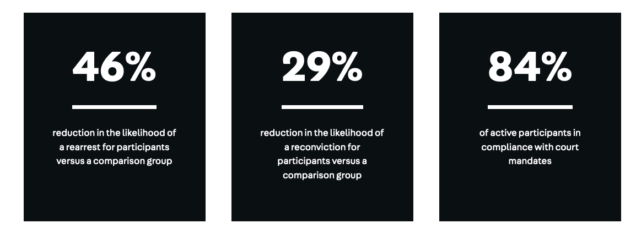A Court that is Making a Difference
By Annemarie E. Hollenback in CJ 725
As a nation, we are making strides towards removing the stigma from mental illness. For many years, defendants in the criminal justice system were not afforded the same care or compassion. It became apparent that there was a need for an alternative to ‘traditional’ criminal court when it came to individuals dealing with mental illness. In response to this, mental health courts have begun to emerge in response to the inability of jails to treat properly and effectively those with mental illness. Their goal is to rehabilitate and treat the offender for their illness, as opposed to using punishment as the only deterrent. Punishing someone for their crime without treating the mental illness that led them to that behavior leaves the offender facing a high percentage of recidivism in their future.
There have been mental health courts in existence for over 20 years. However, in the beginning, not every offender had access to one. They were not in every state or every jurisdiction. As time has gone on, they are becoming more and more prevalent thanks in large part to the criminal justice professionals who recognized a need for this alternative to conventional court for this segment of the population.
The first mental health court in New York City was the Brooklyn Mental Health Court (BMHC). In existence since 2002, when this approach to mental health care vs. incarceration was still a somewhat new idea, the BMHC began to see defendants (called ‘clients’) in their courtroom. There was an approach towards treating the whole person. According to the presiding judge, Matthew D, Erric, defendants with mental health issues had two choices facing them after arrest – they could plead insanity or go to trial/enter a guilty plea and go to prison. Mental health courts provided the defendants with a third option – come to court and agree to treatment. By admitting their mental condition played a part in the commission of their crime, they would receive treatment for their illness and be offered the chance at rehabilitation and a more positive outcome at the end of their treatment program. The participants are still held accountable for their actions but instead of incarceration, they receive appropriate long-term treatment and community-based support.
One of the basic tenents of the BMHC is to treat all clients with respect and dignity, seeing them as individuals with problems that can be addressed within the community as opposed to languishing in prisons. It’s a successful model, boasting the following statistics.

One of the goals of the BMHC is to reduce hospitalizations/arrests and help the clients achieve and maintain psychiatric stability. Not only does the client benefit from this, but this gives their families (spouses, children, etc.) a sense of hope that they would not have if their family member was incarcerated and not receiving any treatment. By diverting clients into treatment vs. prison, the whole family benefits and can heal.
Accountability towards the program is achieved through rewards for positive achievements and sanctions for setbacks. The client is motivated to comply with their treatment plan and treatment plans are tailored to help the client maintain a sense of stability. There is regular monitoring of not only the progress of the client but also the agencies/service providers who are a part of the treatment plan.
As part of the treatment program, the client receives help with health care issues, homelessness, life skills, job searches and they are provided with the tools to become and remain successful outside of the program. The BMHC works with many government and non-profit service providers to address these needs. Instead of serving time and being released, the clients of the BMHC ‘graduate’ from the program. Just the use of the word ‘graduate’ implies they have achieved something in their life. It leaves them with a positive outlook moving forward as well as a feeling of accomplishment. Successful outcomes can result in the client having their criminal charges dismissed or reduced.
The following video offers a glimpse into the BMHC – its mission, its compassion, as well introducing the viewer to some successful graduates of the program.
A successful mental health court can help reduce overcrowding in prisons, reduce the percentage of recidivism and change lives. It provides access to mental health treatment to those who lack the proper insurance to seek treatment. At the time the above documentary was made (2019) the BMHC was celebrating the graduation of the thousandth client from their program. That is no small feat.
The Brooklyn Mental Health Court serves as a model for other mental health courts. They are striving to not only remove the stigma from mental illness but to treat those who are struggling with compassion, dignity, and a desire to help improve lives for both the clients and their families.
Resources:
“Mental Health Courts” in Slate, R.N., & Johnson, W. W. (2008). The criminalization of mental illness. Carolina Academic Press
Center for Justice Innovation: Brooklyn Mental Health Court. https://www.innovatingjustice.org/programs/brooklyn-mental-health-court
YouTube. (2019). Transforming Lives: The Brooklyn Mental Health Court. YouTube. Retrieved February 27, 2023 from https://www.youtube.com/watch?v=IB42mdkOXCs